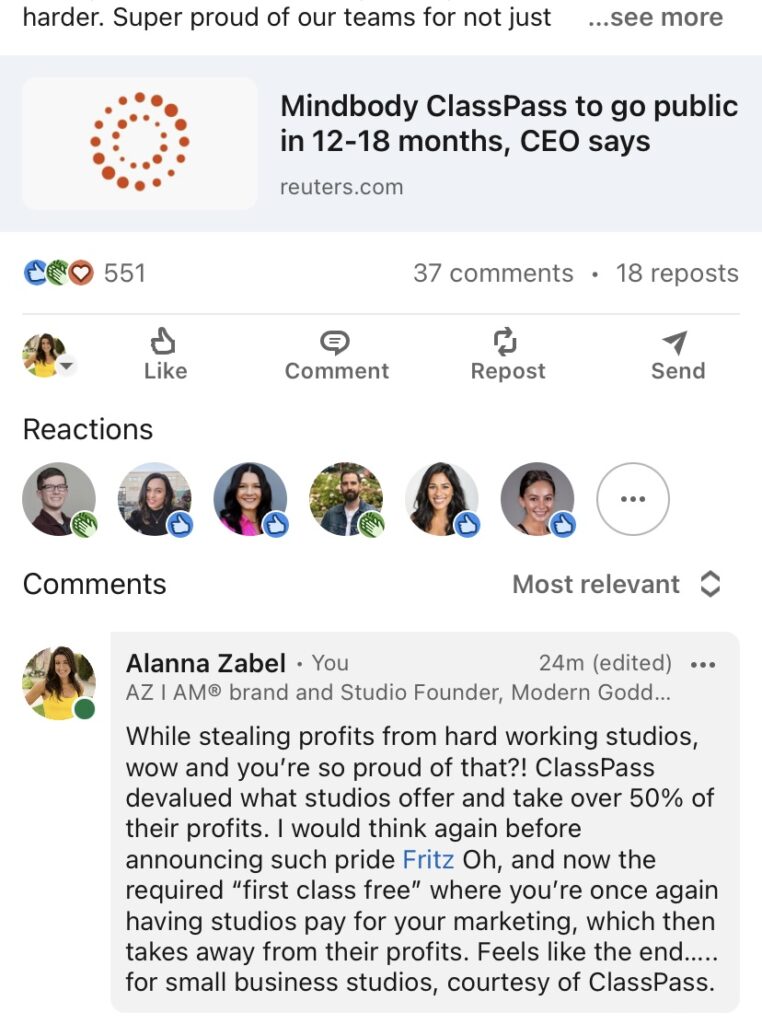As a studio owner and someone who has worked in fitness studios for thirty years, I share with you a clear inside perspective to illustrate the cannibalistic nature of ClassPass’ uninvited wellness industry takeover and devaluation of small business studio services. Since ClassPass recently announced its move to go public, the true source of their success should also be known: they harnessed the profits from hard working small business studios.
The Bitter Irony of ClassPass’s Public Success: The Hidden Costs to Small Business Studios
When ClassPass CEO Fritz Lanman announced his pride in the company’s move to go public, it was a moment celebrated in his business circle. Not one person on his LinkedIn thread was a studio owner, merely business comrades cheering on another “win.” Here was a fitness tech company, originally a small startup, now reaching the pinnacle of corporate achievement—a public offering. But beneath the surface of this corporate success lies a troubling narrative that many in the fitness community know all too well: the cost of ClassPass’s success has been shouldered heavily by the very small business studios that the platform claims to support.

The Business Model: A Double-Edged Sword
ClassPass started as a revolutionary idea, giving users access to a variety of fitness classes at different studios for a single subscription fee. It seemed like a win-win: users got variety and value, while studios gained access to what was promised to be a broader customer base. However, as the platform grew, so did its power to dictate terms to the studios that partnered with it, while they devalued the pricing of the services that studios offered.
ClassPass’s model evolved to take a significant cut from each booking—a minimum of 50% and as high as 80%—a mighty fee for a marketing app that provides a calendar for user’s workout schedules. Studios used to receive, on average, $20 per class, and now they are making $8-$10, when their operating costs have only risen. For small studios already managing to survive on thin margins, this fee structure can and has been devastating. Since 2015 we have seen a massive decline of small business studios, as well as larger chains banning the use of ClassPass in order to survive financially. The studio businesses bear the brunt of costs like payroll, rent, utilities, taxes, customer support, and cleaning. They are the ones creating the value—the unique spaces, the expert instruction, the community vibe—that draws people in. Yet, they are forced to hand over half of their earnings to a tech platform that has, in many ways, commodified their services.
The Human Cost: Undermining Small Businesses
The irony of ClassPass’s public offering is stark when you consider the struggles of the studios it profits from. Many of these small businesses are passionate endeavors, founded by individuals who believe in the transformative power of fitness. They invest not just money but their hearts into creating welcoming spaces for people to improve their health. These studios aren’t just businesses; they are community hubs. They are the ones who pulled their communities through COVID, not ClassPass, who again want to take this credit.
Yet, under the weight of ClassPass’s demands, many of these studios struggle to stay afloat. The deep discounts offered through ClassPass devalue their services, making it difficult for them to attract full-paying customers. Over time, this leads to a vicious cycle where studios become increasingly dependent on ClassPass for business, even as the financial returns dwindle.
The Public Offering: A Celebration of Exploitation?
When the CEO of ClassPass expressed his pride in the company’s IPO announcement, I added a comment. It read, “While stealing profits from hard working studios … you’re proud of that?! … and now the required “first class free,” where you’re once again having studios pay for your marketing, which then takes away their profits?…” Fritz viewed my LinkedIn profile and then deleted my comment. So I posted it a second time. Again, I was the only studio owner on the thread. So Fritz blocked me. It’s important to question what exactly is being celebrated, and who is celebrating. Is it the innovation of connecting people to fitness opportunities? Or is it the ruthless efficiency with which the platform has extracted value from small businesses while devaluing their brands and services?

For the studios, the celebration is bittersweet at best. While ClassPass’s success might be framed as a triumph of entrepreneurial spirit, it is, in many ways, a success built on the erosion of small, independent businesses. The public offering marks a new era for ClassPass—one where its influence will only grow. But for the studios that have paid the price for this success, the future is uncertain.
Required Compliance: Studios Must Give Free Classes so that ClassPass can be Profitable
I disabled my ClassPass account this week, as the CFO of ClassPass emailed me personally, telling me that it is now a studio requirement to offer users First Class Free. I enlightened her as to how many users make multiple email addresses so as to continue benefiting from their third and fourth “first time.” I chose to finally break up with ClassPass, a very dysfunctional and one-sided relationship that was only hurting my business.
On Aug 13, 2024, at 9:48 AM, Kristin Heintz wrote:
Hi Alanna,
Hope you’re well. To briefly introduce myself, my name is Kristin Heintz and I’m a member of the executive team at ClassPass. I’m writing to touch base with you on the latest on the First Class Free program at ClassPass.
I know Kate and others on our team have been in touch with you in the past on First Class Free, and that historically you haven’t been interested in participating. I wanted to let you know that going forward, First Class Free will be a mandatory part of working with ClassPass. We’re currently working with the small number of remaining non-participating partners like AZ I AM to determine next steps with them, and wanted to reach out to see how best we can support you with this change. We deeply value our partnership with AZ I AM and are open to doing whatever we can to answer your questions about First Class Free and otherwise facilitate a seamless transition. As Kate has communicated in the past, based on what we’ve observed with our participating partners, we anticipate that the transition to First Class Free will increase AZ I AM’s revenue on ClassPass, as it means you will start to be listed in the ClassPass trial, which will help get ClassPass early life users in your studio’s radius hooked on your studio when they’re in their “shopping period” and deciding where to habituate.
Let’s schedule a time to review this update and discuss any customizations we need to put in place. We can make time next week on Monday 8/19 at 1pm PT, Tuesday 8/20 at 11:30a or 1p PT, Wednesday 8/21 at 12:30p or 1p PT, or Friday 8/23 at 10:30a, 11a, 12p, 12:30p, or 1p PT; if none of those work for you or if you’d prefer earlier or later in the day, Suzanne CCed can provide alternative times.
Thanks,
Kristin Heintz
SVP Finance, ClassPass
From: Alanna Zabel
Sent: Tuesday, August 13, 2024 1:05 PM
To: Kristin Heintz
Subject: Re: ClassPass Setup – First Class Free
Hi Kristin – There’s absolutely no way first class free generates more revenue. Do you know how many users make multiple email addresses and keep coming for their third first time?
I have worked in yoga studios for 30 years. ClassPass is first hand responsible for destroying small business studios, and I am certain that you all know that.
I will not participate with the first class free.
You can deactivate our class option listing and keep our wellness listing.
I won’t let ClassPass destroy my business more than it already has.
Alanna Zabel
AZ I AM
The Path Forward: Reconsidering the Model
As ClassPass moves forward, it’s crucial for the company—and its customers—to reflect on the impact of its business model. Supporting local studios means more than just booking classes through an app. It means recognizing the true cost of convenience and considering direct support to these businesses, ensuring they can thrive independently.
Had ClassPass taken a 15-20% cut of the profits, we studios would have celebrated their uninvited presence at our table. AirBnB works on a similar business model: you rent your home and we’ll take a cut of the revenue. Imagine if AirBnB took 50% of the profits and didn’t even offer customer service?! This is precisely what ClassPass has done. It could have been a wonderful partnership, instead of a cannibalistic endeavor that turned a blind eye to the small studios they put of out business in order to usurp control over their revenue. Had they been considerate, studio owners like myself wouldn’t have created petitions to have them banned: https://www.change.org/p/ban-classpass-from-your-fitness-studio or chosen to disable their ability to make a profit.
The studios who have been successful do not offer ClassPass to their customers. The major studio chains who do offer ClassPass are are brand driven; they have the wiggle room to minimize their profits because, again being brand driven, they do not pay their instructors more than $25-30 per class. In the end, the same equation results regardless of how these businesses get there: reduce the value of the brick and mortar experience so that major corporations can capitalize on their hard work.
The fitness community, too, must recognize the power of their choices. Every booking, every subscription, has the potential to either uplift small businesses or further entrench them in a system that undervalues their contributions. The next time you book a class, consider doing so directly through the studio. It might be a small act, but it’s one that can help ensure these valuable community spaces continue to exist.
In the end, ClassPass’s public success is a complex story—one that’s worth celebrating only if we don’t lose sight of the small businesses that made it possible for them by doing the majority of the work.
